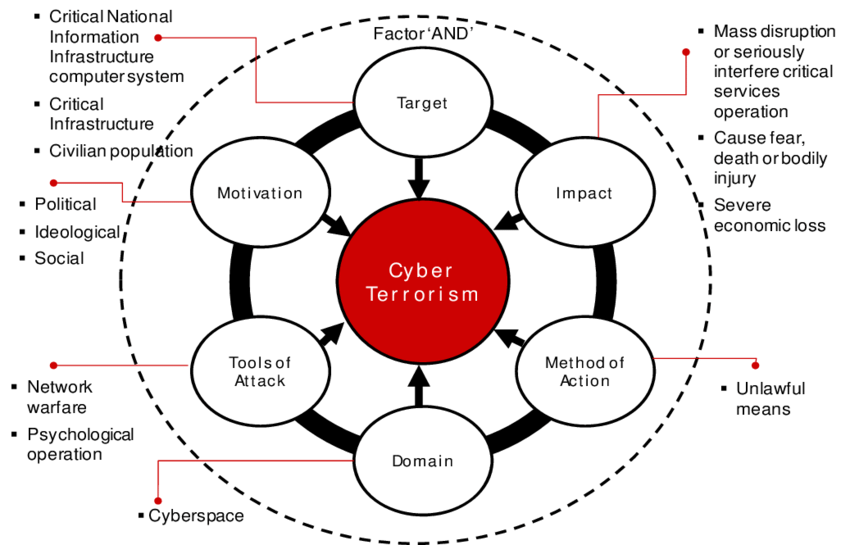Just last month, there have been uncountable cyber terrorist attacks. One news shows, Chinese hacking group breached several German pharma and tech firms. It was claimed by the German government that the hack into networks of service providers and companies was an attempt to steal intellectual property.
Another news shows that there was shutting down of internet traffic to and from North Korea twice in two weeks which was likely a series of DDoS attacks. The second attack came just after North Korea’s 5th missile test of the month. There were apparently many more incidents that took place in different places in the world. These two incidents demonstrate cyber terrorism.

What is Cyber Terrorism?
Cyber terrorism is defined as a religious or politically motivated attack against information security, programs and data to cause severe disruptions or widespread threat in society.
Computer technology is exploited for money and power. The most common means of cyber terrorism include disruption of various major websites to cause a public panic, unauthorized access to critical infrastructure systems to disrupt cities, factories, etc. Cyber Terrorism expands to more violent terrorist attacks taking place instead of just non-violent political agenda.

How big is the threat of Cyber Terrorism?
The roots of cyber terrorism trace back to early 1990s in the age of rapid growth of Internet. Today, the threat of Cyber Terrorism is more than ever.
One of the most commonly and frequently used cyber terrorist activity is Hacktivism. This is because the most common target of cyber terrorism is password attack. Usually it occurs at a great frequency. Hacktivism is defined as use of computer-based techniques such as hacking as a form of civil disobedience to promote a political agenda or social change. Even though it has limitations, hacktivism may be used to post propaganda on target sites, such as the posting of successful insurgent attacks in Iraq on US.
It forces data on the web pages of vulnerable government websites and other popular western web forums. The same techniques are used to leave encrypted messages on public sites and transmitting a number of communications from manuals to execution orders to coordination strategies for an attack.
Cyber terrorism holds the power to bring down any country or city to absolute crushes. Internet can be used by cyber terrorists to hack and cause damage into a city’s or country’s transportations, water supplies, electricity supplies, etc.
How to prevent getting involved and being more secure?
The amount of trust and dependence we put on technology today has made us vulnerable to giving a chance to terrorists to make us a target. The threat of cyber terrorism might be exaggerated or manipulated but we can not ignore or deny it. If you are on the internet, you are prone to getting involved.
Some of the ways to keep yourself away from getting involved in cyber-terrorism are:
- Being more secure with your data by limiting the personal information you share online.
- Being aware of the email bombs.
- Installing anti-malware software in your devices.
- Being aware of scam websites and companies online.
- Changing your password frequently.
- Avoiding usage of public Wi-Fi’s.
- Not trusting third party or pirated software.
Sources:
https://securityboulevard.com/2022/01/a-beginners-guide-to-cyber-war-cyber-terrorism-and-cyber-espionage/
https://www.csis.org/programs/strategic-technologies-program/significant-cyber-incidents
https://www.jstor.org/stable/26486748?seq=1#metadata_info_tab_contents
https://www.techtarget.com/searchsecurity/definition/cyberterrorism
https://www.usip.org/sites/default/files/sr119.pdf

Great Article! Cyber-terrorism is a threat to many nations and governments, but internal security agencies often run into issues with enforcement, either due to jurisdictional issues or the inability to identify the perpetrator. What then, in your opinion, is the best way to go about enforcing laws (criminal or otherwise) against cyber-terrorists?
Thank You! In my opinion, the first step towards preventing cyber terrorism legally should be to set up a system for scanning websites and apps for vulnerability. Other thing I think is that only a good hacker himself can identify the possibility of some website or credentials getting hacked, so appointing good intent hackers to check up for cyber crimes regarding cyber terrorism can be a good way to go. Except for that I think that corruption exists everywhere and each country has it’s own laws which can only be effective when majority really wants.
This is an interesting topic! Cyber terrorism can cause massive damage to to government systems and might leave a country in fear of further attacks. In the coming years there has been several issues of cyber terrorism and is increasing everyday like for example recently like there was a cyber attacks in Ukraine, Hackers breached the Canadian Foreign Ministry, hampering some of the Ministry’s internet-connected services, Hackers shut down internet traffic to and from North Korea twice in two weeks and many more. and it’s just gonna increase and there isn’t any possible way to stop this and is going to ruin the entire world. And since we are already prone to the internet there is a chance we are also involved in it.
Thank You so much! You are absolutely right,, there is always a chance that we get involved unintentionally.
It’s interesting to me that the weapons of the future seem to be computers, rather than guns and missiles. One of the main limitations I see to preventing these sorts of attacks, is that the incentive on the side of the side of the attacker seems to be higher. I’m not sure that an IT professional has the same “motivation” in defending their systems as a hacker has in attacking it. The one scenario where I don’t think this applies is in military/government organizations, however even then it could be possible there is a mismatch of motivations.
Hi! It’s really scary how Cyber terrorism can take down almost any cities to absolute crushes. If Cyber-terrorist can take down a city, I am 100% sure hacking into my securities will be a no big deal for them. Since we are exposed to many hazards out here in internet, we should always have a backup plans as well as becareful what we do on internet. I think if we watch out for two main things, we should be safe out in internets. Two things are not leaking our private informations to anyone (especially online) and not clicking into suspicious emails!
With ongoing political tensions, cyberterrorism can contribute to far more damage. With cyberterrorism, individuals are hiding behind screens, and they can be pretending to be other parties to incite violence for their own agenda. It is important to keep your guard up online, to prevent unwanted access and actions on your behalf, especially for those working in high security fields.
It seems like as nations become more technologically advanced and rely more on technology that the extent of damage that an cyberattack could inflict increases. And as such I wonder if some terrorists group like ISIS would focus on cyberterrorism to cause more and more damage on western countries. In addition I wonder if in the future a cyberattack would be treated like a terrorist attack as cyber attacks have the potential to cause massive economic damage and threaten many lives.
It is inevitable that with the rise of technology, cyberterrorism has increased. Many people believe that hacking can be morally permissible if it benefits society or is done to exercise the right to a free flow of information, eliminate waste, or to exhibit politically motivated activity and civil disobedience. There are organizations all over the world who hack into systems to show protest against unjust in the society. I can support these hactivisms to a certain extend where no individual is harmed and intention is not to cause harm out of malice. However, this type of hacking is rarely seen and usually the main motive is to gain intellectual property or for financial gains. If we do not take preventing measures, we might witness great nation getting destroyed with such cyber-attacks.
Hi, nice post!
It is indeed a little frightening that cyber terrorism attacks increase more and more everyday. Actually, I remember reading an article about a cyber terrorism attack on T-Mobile last summer. 13 million customers AND 40 million people who had applied for an account with T-Mobile had their personal data compromised.
Great Post, The World Economic Forum (WEF) has highlighted that a significant proportion of cybercrime goes undetected. The Department of Justice (DOJ) has recently been more specific: one in seven cybercrimes are reported, which means over 85% of cybercrime is left hidden in an organization. Thank you for such an informative blog.
Great post! It’s quite unfortunate how our reliance on technology has led to a greater influence these attacks have over our lives. Back then, it was not uncommon for me to think that cyber terrorism was a threat for large-scale organizations and not me. But as you have clearly highlighted, our increasing reliance on this kind of technology has led to us getting involved. This really stresses the importance of being educated and learning that we really are just as involved in cyber threats as these large-scale organizations.